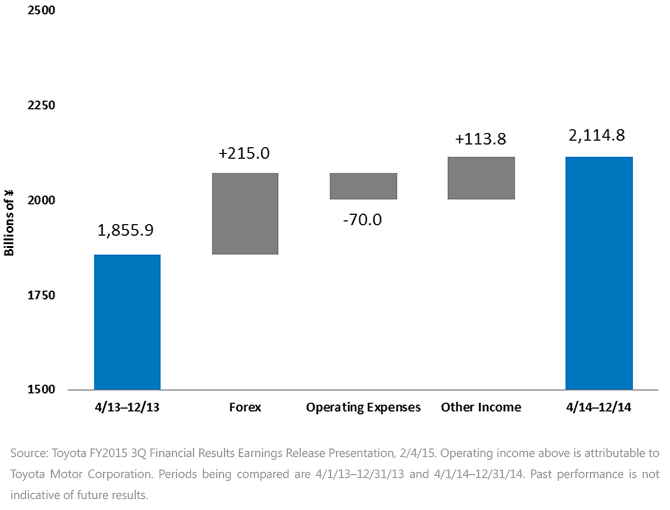Japan Quarterly Earnings: Weaker Yen Helps Exporters


 • Yen Depreciation Dramatically Contributes to Earnings – The depreciation of the yen accounted for 215 billion yen of the 258.8 billion yen growth in income compared to the same reporting period last year. It is important to realize that Toyota’s gain from the yen depreciation represents more than 80% of the total growth in income for the period.
• Further Yen Depreciation Can Add to Future Profits – If the yen continues to depreciate, it could potentially continue to add to Toyota’s bottom line. Toyota has forecast to sell 9.0 million vehicles in its 2015 fiscal year, and 6.85 million (approximately 75%) of those are expected to be sold outside Japan.1 The continued overseas sales converted back to a potentially weaker yen translate to even more yen revenue. Commenting on the forecasts for Toyota’s 2015 fiscal year, Takuo Sasaki, chief director of accounting, said, “While we expect a reduction in vehicle sales, we are raising our operating income forecast by 200 billion yen to 2.7 trillion yen, factoring in the change in our foreign exchange rate assumption and the progress in our profit improvement activities, such as cost reduction efforts.”
• Toyota’s Stock Performance Also Strong – Market participants have recognized the benefit a weaker yen has had on Toyota’s bottom line. Toyota’s total return was approximately 21.2%, while the broader Tokyo Stock Price Index (TOPIX) for Japan was up 10.3%, over the 2014 calendar year. The yen was down 12.1% during this same period.2
Other Automakers Also Benefit from a Weaker Yen
Other large Japanese automakers have benefited from a weakening yen due to their export-oriented business models. The list below shows two major automakers and the amount of reported income during their most recent earnings periods compared to the same periods of the preceding year3.
• Honda – Reported operating income of 539.7 billion yen, down 45.2 billion yen from the year before, but had a gain of 43.1 billion yen from currency effects4
• Mazda – Reported operating profit of 152.0 billion yen, up 27.4 billion yen from the year before, with a gain of 18.9 billion yen from currency effects5
U.S. Automakers Facing Headwinds from a Stronger Dollar
Previously we discussed how some U.S. multinationals are being negatively impacted from a strengthening dollar. The strengthening dollar also had a negative impact on a few U.S. automobile companies during the 2014 calendar year. These U.S. companies directly compete with Toyota and other Japanese automotive companies across the globe, and as the dollar strengthens against the yen, the U.S. companies become less competitive.
• General Motors – Reported earnings before interest and taxes (EBIT) of $6.5 billion, down $2.1 billion from the year before, with a loss of $1.3 billion attributed to foreign exchange6
• Ford – Reported pretax income of $4.5 billion for its automotive sector, down $2.4 billion from the year before, with a loss of $1.1 billion attributed to foreign exchange7
Hedge Your Currency Exposure
If the yen continues to weaken, Japanese exporters should continue to benefit. On the other hand, a weakening yen is not good for U.S. investors in Japanese equities—unless they hedge the currency. Currency-hedged strategies allow investors to focus on Japanese equities without the worry over currency declines.
For current holdings of WisdomTree ETFs, please visit wisdomtree.com.
1Source: Toyota FY2015 3Q Financial Results, 2/4/15.
2Source: Bloomberg.
3Period is the first nine months of their 2015 fiscal years compared to the first nine months of their 2014 fiscal years.
4Source: Honda FY2015 3rd Quarter Financial Results, 1/30/15.
5Source: Mazda FY2015 Third-Quarter Financial Results, 2/4/15.
6Source: General Motors Q4 2014 Financial Results, 2/4/15.
7Source: Ford Q4 2014 Earnings Release, 1/29/15.
• Yen Depreciation Dramatically Contributes to Earnings – The depreciation of the yen accounted for 215 billion yen of the 258.8 billion yen growth in income compared to the same reporting period last year. It is important to realize that Toyota’s gain from the yen depreciation represents more than 80% of the total growth in income for the period.
• Further Yen Depreciation Can Add to Future Profits – If the yen continues to depreciate, it could potentially continue to add to Toyota’s bottom line. Toyota has forecast to sell 9.0 million vehicles in its 2015 fiscal year, and 6.85 million (approximately 75%) of those are expected to be sold outside Japan.1 The continued overseas sales converted back to a potentially weaker yen translate to even more yen revenue. Commenting on the forecasts for Toyota’s 2015 fiscal year, Takuo Sasaki, chief director of accounting, said, “While we expect a reduction in vehicle sales, we are raising our operating income forecast by 200 billion yen to 2.7 trillion yen, factoring in the change in our foreign exchange rate assumption and the progress in our profit improvement activities, such as cost reduction efforts.”
• Toyota’s Stock Performance Also Strong – Market participants have recognized the benefit a weaker yen has had on Toyota’s bottom line. Toyota’s total return was approximately 21.2%, while the broader Tokyo Stock Price Index (TOPIX) for Japan was up 10.3%, over the 2014 calendar year. The yen was down 12.1% during this same period.2
Other Automakers Also Benefit from a Weaker Yen
Other large Japanese automakers have benefited from a weakening yen due to their export-oriented business models. The list below shows two major automakers and the amount of reported income during their most recent earnings periods compared to the same periods of the preceding year3.
• Honda – Reported operating income of 539.7 billion yen, down 45.2 billion yen from the year before, but had a gain of 43.1 billion yen from currency effects4
• Mazda – Reported operating profit of 152.0 billion yen, up 27.4 billion yen from the year before, with a gain of 18.9 billion yen from currency effects5
U.S. Automakers Facing Headwinds from a Stronger Dollar
Previously we discussed how some U.S. multinationals are being negatively impacted from a strengthening dollar. The strengthening dollar also had a negative impact on a few U.S. automobile companies during the 2014 calendar year. These U.S. companies directly compete with Toyota and other Japanese automotive companies across the globe, and as the dollar strengthens against the yen, the U.S. companies become less competitive.
• General Motors – Reported earnings before interest and taxes (EBIT) of $6.5 billion, down $2.1 billion from the year before, with a loss of $1.3 billion attributed to foreign exchange6
• Ford – Reported pretax income of $4.5 billion for its automotive sector, down $2.4 billion from the year before, with a loss of $1.1 billion attributed to foreign exchange7
Hedge Your Currency Exposure
If the yen continues to weaken, Japanese exporters should continue to benefit. On the other hand, a weakening yen is not good for U.S. investors in Japanese equities—unless they hedge the currency. Currency-hedged strategies allow investors to focus on Japanese equities without the worry over currency declines.
For current holdings of WisdomTree ETFs, please visit wisdomtree.com.
1Source: Toyota FY2015 3Q Financial Results, 2/4/15.
2Source: Bloomberg.
3Period is the first nine months of their 2015 fiscal years compared to the first nine months of their 2014 fiscal years.
4Source: Honda FY2015 3rd Quarter Financial Results, 1/30/15.
5Source: Mazda FY2015 Third-Quarter Financial Results, 2/4/15.
6Source: General Motors Q4 2014 Financial Results, 2/4/15.
7Source: Ford Q4 2014 Earnings Release, 1/29/15.Important Risks Related to this Article
This information should not be considered a recommendation to buy, sell or hold the individual stocks referenced above.


